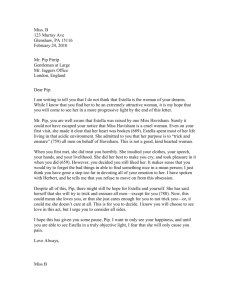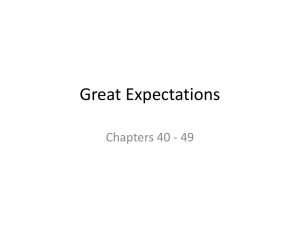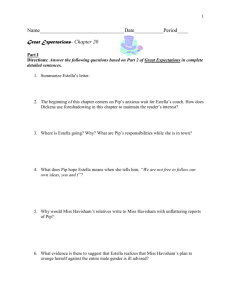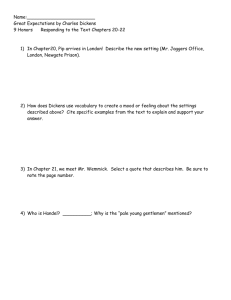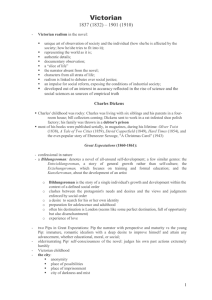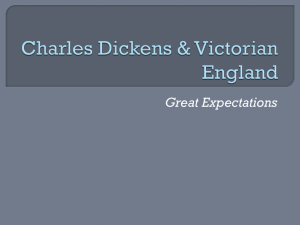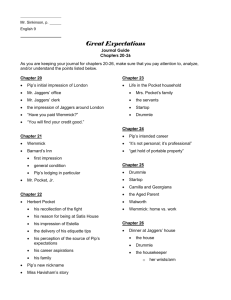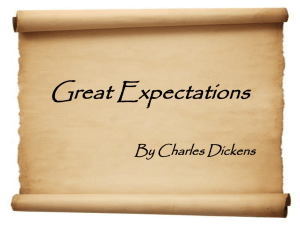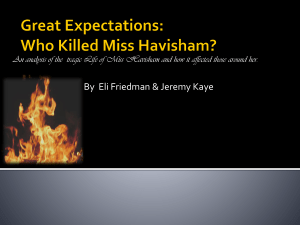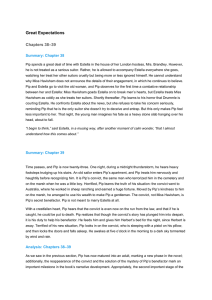Is Great Expectations a Mystery, a Buldingsroman, a Love Story, or
advertisement
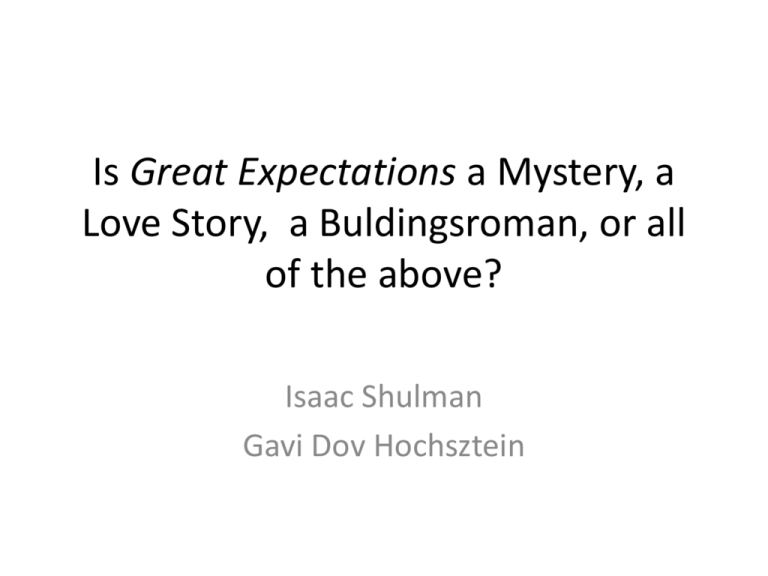
Is Great Expectations a Mystery, a Love Story, a Buldingsroman, or all of the above? Isaac Shulman Gavi Dov Hochsztein Elements of a Mystery: 1. There is mysterious information in the beginning that seems unnecessary. 2. There is something unknown to the “detective.” 3. There are a lot of plot twists. 4. There is a red herring (and the solution to the mystery is usually different then the first thought). Comparison to The Murder on the Orient Express (Agatha Christie): 1. Ratchet asks Poirot to be his bodyguard the first night. 2. Ratchet dies – who killed him? 3. Poirot’s ideas changed every time he received new evidence. 4. The watch makes Poirot think that the murder was committed at a different time during the night. Great Expectations: 1. The episode with the convict seems to have nothing to do with the progression of Pip’s adventure (learning, being an apprentice, going to London to become a gentleman…). 2. Pip has no idea who his benefactor is. 3. Magwitch turns out to be his benefactor so Miss Havisham isn’t and therefore, he isn’t destined to marry Estella (Bentley Drummle is). 4. It appears that Miss Havisham is Pip’s benefactor and that he is destined to marry Estella while in fact it is Magwitch. Other Mini-Mysteries in Great Expectations: • Pale young gentleman – Herbert (“‘And you,’ said I, ‘are the pale young gentlemen’” – page 183). • Miss Havisham’s fiancée – Compeyson (“Young Havisham’s name was Arthur. Compeyson is the man who professed to be Miss Havisham’s lover” – page 373). • Estella’s father – Magwitch (“this acquitted young woman and provis [Magwitch] had a child…” “did the women keep her oath [to destroy the child]?” “…he says she did.” “And the man we have in hiding [Magwitch] down the river is Estella’s father” – page 433). o (And mother) – Jagggers’ maid (“but her hands were Estella’s hands and her [Jaggers’ maid] eyes were Estellas’ eyes and if she had reappeared a hundered times, I could have neither more sure nor less sure that my conviction was the truth.”) Elements of a Love Story 1. One person loves someone else 2. Competition (or something else getting in the way of their marriage) 3. The journey for the lover to achieve the whom he/she loves 4. Either a happy ending (marriage) or a sad one (rejection) Comparison to the end of The Alchemist (Paulo Coelho): 1. Santiago meets Fatima in the oasis and loves her. 2. He has to fulfill his Personal Legend (before he can marry her). 3. He journeys with the Alchemist to Cairo and found near the pyramids that the treasure was where he started his journey. He then went back to get it. 4. He felt that she wanted him and (most likely) went back to the oasis to marry her. Great Expectations: 1. 2. 3. 4. Pip loves Estella but she has been brainwashed by Miss Havisham to love no one (“When you say you love me, I know what you mean as a form of words, but nothing more… I have tried to warn you of this, have I not?” – page 384 “Who taught me to be proud?… Who taught me to be hard?” – page 325). Bentley Drummle is also a suitor of Estella and unlike Pip, he is filthy rich. He present competition for winning Estella’s love. Pip travels to London and learns from many people to be a gentleman (especially Matthew Pocket. He encounters many different situations along the way and meets many new people. Depending on which ending is read, Pip either wins Estella because she learns to love or doesn’t because she never gets married. Other Mini-Love Stories in Great Expectations: • Clara and Herbert (“And Herbert had gone away to marry Clara” – page 511) • Miss Skiffins and Wemmick (“‘Halloa!' said Wemmick. ‘Here’s Miss Skiffins! Let's have a wedding.’” page 482) • Biddy and Joe (“‘Its my wedding day,’ cried Biddy, in a burst of happiness, ‘and I am married to Joe!’” – page 509) Elements of a Buldingsroman: 1. It tells the story of the protagonist as he/she comes of age. 2. It shows a major change in the character’s character (epiphany). 3. There are helpers and obstacles along the way. 4. It often includes near-death experience. Afterwards, the protagonist emerges anew. Comparison to The Catcher in the Rye (J. D. Salinger): 1. The plot of The Catcher in the Rye is about Holden’s life when he decides to ‘take on the real world’ in New York after getting kicked out of school. 2. He decides that he doesn’t need to be the ‘catcher in the rye’ when he saw Phoebe playing. 3. There are many helpers and obstacles along the way: a. Helpers: Mr. Antolini, Phoebe, Sally b. Obstacles: his brain disorder, Stradlater, Ackley, and Morris 4. At the end, Holden goes to museum and is really sick. He goes to the bathroom and passes out… (“I sort of passed out. I was lucky, though. I mean I could’ve killed myself when I hit the floor… I felt better afterward I passed out. I really did.” – page 204) Great Expectations: 1. 2. Pip grows up from a little boy to an adult (and a gentleman). He changes from being a “common boy” to a “gentlemen.” His epiphany is when he is sick and realizes that he should be grateful to Joe for all that he does for him (“Joe had actually laid his head down on the pillow at my side and put his arm around my neck in his joy that I knew him” – page 493). 3. There are many helpers and obstacles along the way: a. Helpers: Herbert (“Herbert was my intimate companion and friend” – page 214), Wemmick, Joe, Mr. Pocket, Magwitch b. Obstacles: Miss Havisham, Bentley Drummle, Compeyson 4. Pip is sick and Joe helps him (“I had a fever and was avoided, that I suffered greatly…” – page 492).
